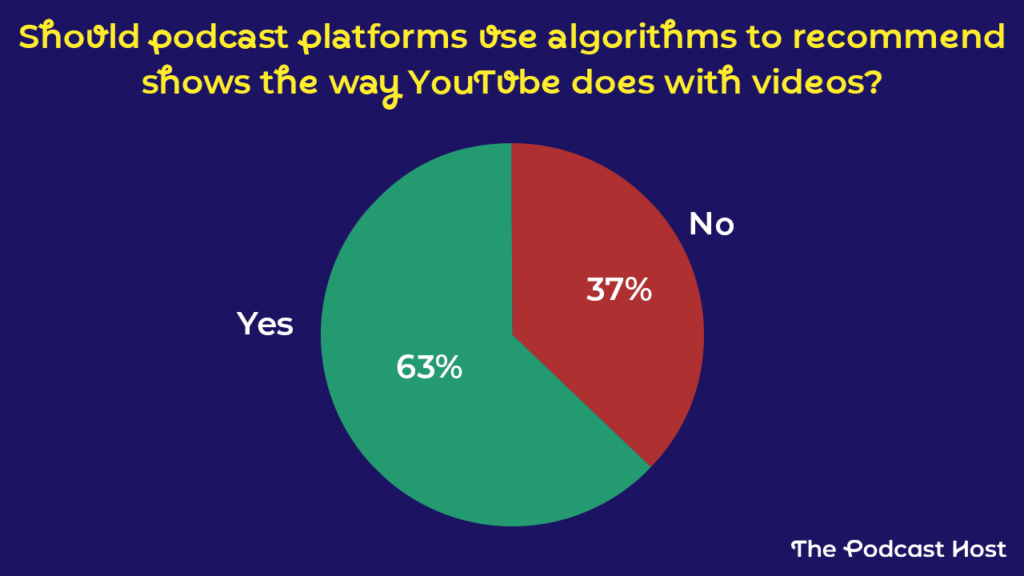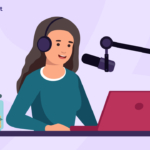Are Algorithms Good for Podcasting?
It’s funny to think that the word ‘algorithm’ was barely in our vocabulary just a few years ago. Nowadays, algorithms dictate so much of what we do and what we consume – so much to the point that some even say algorithms are controlling our lives. Yikes!
But algorithms can be really positive too – especially when it comes to helping us find more content that we’re actually interested in and want more of.
It’s not hard to see how they can be super beneficial to podcasting, for both listeners and creators. However! It’s also easy to see why creators and industry folks are conflicted about the long-term impact of algorithms.
We’ll dive into the reasons why everyone’s so split on this topic in just a sec. But first, let’s quickly clarify how algorithms currently influence how people find and listen to new podcasts.
How Do Algorithms Work in Podcasting?
Some podcast listening platforms (most notably Spotify) use algorithms to recommend new shows to listeners. The technology does this by gathering and analysing large amounts of listening data and using machine learning to direct them towards shows with similar qualities or shows that similar listeners enjoy.
The more podcasts you listen to, the better the algorithm gets to know your interests and tastes and can suggest more of what it knows you like.
When you search for podcasts on an algorithm-driven platform, results are ranked by factors like relevance, popularity, and download numbers, as well as keywords in titles and descriptions.
But it isn’t just about search. Recommendations on a home page or sidebar can be algorithmically-driven, too. How many times have you ended up going down a YouTube rabbit hole on videos or topics you definitely weren’t searching for?
Outside of Spotify and YouTube, algorithms are either much more subtle, or absent altogether. But have they become so ingrained in our online habits that listeners will soon expect them in every app – podcasts included?
Algorithms in podcasting split opinion. Critics say they flatten taste, reduce variety, and erode nuance. Supporters argue that they give creators a better chance to be discovered, go viral, and grow an audience.
We asked a bunch of creators if they think podcast listening platforms should use algorithms more like YouTube does for video content. Here’s what they said:

63% of creators think they should use algorithms more to recommend new content to listeners, while 37% don’t think they should.
But what are the reasons why creators feel the way they do about algorithms in podcasting? Let’s dive in.
Podcast Algorithms: Friend or Foe?
First, here are a few ways algorithms are doing good things for podcasting and why some creators we spoke to want listening platforms to leverage them more in their technology.
Why Algorithms May Be Good For Podcasting
Algorithms solve discovery issues
Podcasting has always had a bit of a discoverability problem. As a listener, it’s not so easy to find your next binge-worthy podcast that ticks all your boxes; for creators, reaching new listeners can be a challenge if you’re not making the charts.
This is why the industry still relies quite heavily on word of mouth to reach the right listeners, which a lot of people find frustrating and archaic.
“Word of mouth isn’t enough. My audio only podcast is 100 times smaller than my YouTube and Spotify is now helping discoverability of my video podcast. It’s great for everyone. Podcasting is like blogs. Stuck in 2005 internet. It needs an upgrade”
– Anonymous podcaster
Algorithms tackle this by hyper-personalising listener searches and using their listening history data to uncover more of what they like. Many of the creators who took our survey think this is the direction podcasting platforms should take.
“[Podcast platforms] should do a better job of categorizing, highlighting, and promoting new, relevant, interest matching, and trending podcasts.“
– Anonymous podcaster
Algorithms democratise access
Theoretically, algorithms can also give smaller, independent creators a new path to finding the right audience.
Podcast charts are completely unreachable for the vast majority of independents, and achieving high growth quickly normally requires a decent marketing budget and/or industry connections to help promote your show.
Algorithms democratise the process by allowing lesser-known shows to potentially gain traction based on things like high engagement and relevance to a listener’s history, rather than how well-promoted they are.
Algorithms improve listener experience
Some believe that algorithms should be used more because they simply improve the listener experience overall.
By recommending a steady stream of new shows, this takes the effort out of digging for new content and potentially wasting time on subpar shows. Some survey respondents also suggested that the algorithm can get to know a listener’s interests better than they know themselves:
“Sometimes people don’t know what they want and AI can Identify interests better than someone may be able to articulate it.“
– Anonymous podcaster
Why Algorithms May Be Bad For Podcasting
While all of the above points carry weight, it’s also worth bearing in mind that algorithms aren’t all rosy. Here are some reasons why many believe there’s a danger in relying too heavily on algorithms for podcast discovery.
Podcasters create for algorithms instead of people
One inevitable issue with algorithms being so effective at delivering content to the right audiences is that creators start creating content for the algorithm instead of for their niche audience or for their own creative expression.
Matthew recently had a really interesting chat about this with Jeremy Enns from Podcast Marketing Academy on this episode of the Podracft Podcast.
“If you want to win at the algorithm game, you’re no longer following your creative energy. You are creating for the algorithm, not for the stuff that lights you up and probably is going to resonate most with your audience.
There’s this whole theory called ‘dead internet theory’, which is basically that the way algorithms are leading us is that everything is just going to be created for algorithms and not for people. This just leads to this morass that nobody actually wants to engage with and so people will opt out.”
– Jeremy Enns, Podcast Marketing Academy
Algorithms can create bubbles and echo chambers
And while being recommended more of what you like is certainly not a bad thing, what about the unexpected gems that sit outside of your listening history trends?
Algorithms can create content bubbles and echo chambers, where listeners are constantly fed a single perspective that can lead them down a particular path of thinking. This is quite contra to the concept of podcasts as a tool for educating listeners and providing diverse perspectives.
One pre-launch podcaster told us she has reservations about this:
“I think rabbit holes are unhelpful and result in the potential for narrowing horizons and breadth of awareness.”
– Claire MacLeod, Gen Z Career Coach
Algorithms can be manipulated
As with any technology that brings content creators success, it’s not unusual for podcast algorithms to be gamed or manipulated for an ulterior motive (to make more money or push a particular political perspective, for example).
For this reason, many podcasters and industry folks think there’s a danger in podcast platforms relying too heavily on algorithms.
As one anonymous podcaster in the survey put it:
“Social media algorithms have been responsible for promoting and normalizing the disastrous trends of the past decade.”
And not everyone’s convinced that YouTube’s algorithm is as democratic as we’re led to believe:
“I intensely dislike YouTube’s UI and would be surprised if their algorithm is revenue agnostic.”
– Anonymous podcaster
What Does This All Mean for You?
Whether you’re pro, anti, or indifferent to algorithms, most of this is outside of your control. You’ll have little influence on whether platforms choose to fully embrace them.
The one thing you can control is your content, and your approach to podcast discovery.
There are loads of things you can do to make your podcast more discoverable. Our SCALE framework contains no fewer than 30 ways to promote your podcast, but here are some low-hanging fruit pointers to get you up and running:
- Collaborate with other podcasters in your niche. Swap trailers and episodes, run co-hosted and montage pieces.
- Optimise your show’s essential details. Are your podcast name, description, and episode titles the best they possibly could be?
- Create content that others can’t help but share. Think lists, comparisons, reviews, costs, how-tos, and case studies for starters.
Maybe there is a podcast discovery problem, soon to be magically solved by a benevolent machine God. But, to play devil’s advocate, why would an algorithm favour your show in particular? There are more than four million podcasts out there.
Some podcasters reject the claim that there’s a widespread discovery problem in podcasting. After all, people discover new podcasts every single day. Discovery problems can exist for individual shows, but the great news is that this empowers you to do something about it. You don’t need to hope or wait on a tech company to do it for you.

